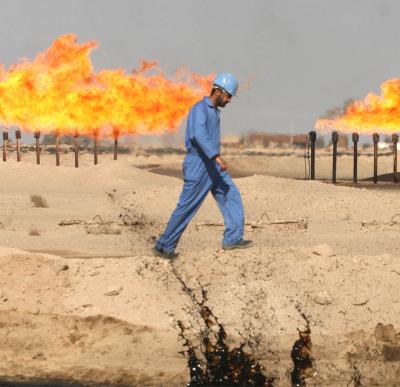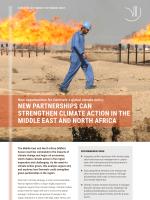New partnerships can strengthen climate action in the Middle East and North Africa

- Integrate conflict resolution with climate adaptation and resource management in cooperation with international and local partners in climate vulnerable countries.
- Ease geopolitical tensions over energy transition and seize green momentum through partnerships with major oil-rent economies and climate diplomacy.
- Identify context-sensitive solutions to linkages between climatic and security challenges by building interdisciplinary networks across governments, research, NGOs and the private sector.
The Middle East and North Africa (MENA) house countries vulnerable to the impacts of climate change and major oil economies, which makes climate action in the region imperative and challenging. As the need for climate action grows, this analysis argues why and explores how Denmark could strengthen green partnerships in the region.
Denmark's climate strategy, A Green and Sustainable World, neglects MENA, a region highly exposed to negative impacts from climate change. Climate models project that the region will warm at twice the global average.
Furthermore, 60 percent of people in the region already live in areas with high water stress, and the population is projected to double in the period from 2000-2050.
Climate change will worsen existing challenges like water shortage, desertification and extreme heat, with dire prospects particularly for the region's poorest. At the same time, MENA countries contribute 37 percent of global oil production and is home to several of the world's most fossil fuel-dependent economies.
Keeping in mind the magnitude and complexity of the connected climate, security and political challenges in the region, there are no prospects of easy fixes. However, context-sensitive partnerships with countries plagued by violent conflicts and oil-rent dependent economies could create avenues for Danish foreign and security policy that promote climate action as well as conflict resolution in the region.
Considering the comprehensive approach and funding for green development, Denmark is in a good position to aid mainstreaming climate adaptation and resource management into its security and development operations.
Adaptation and conflict resolution in countries vulnerable to climate change
MENA is home to some of the world's most climate change vulnerable countries, particularly Iraq, Libya and Yemen. Climatically, all three countries are highly exposed to extreme heat, water scarcity and limited food availability. Economically, they are among the least diversified in the world, with fossil fuel rents constituting more than 40 percent of GDP in Iraq and Libya.
Although the consequences of climate change are increasingly seen and felt, ongoing violent conflict and dependency on fossil fuel rents result in limited political attention to climate change.
In contexts where climate change risks catalysing conflicts, Denmark could contribute. Denmark already has extensive experience working particularly in Iraq through military, development and humanitarian efforts, and now leads the NATO mission in Iraq.
Denmark led the UN mission in Yemen in 2019, contributed to multilateral and humanitarian efforts in the region, and was among the most active countries in the air campaign in Libya in 2011. A comprehensive approach, which combines political, civilian and military instruments, has been central to Danish military engagements abroad for decades.
Further, Denmark has pledged to earmark 60 percent of its development aid for climate action to adaptation projects. Considering the comprehensive approach and funding for green development, Denmark is in a good position to aid mainstreaming climate adaptation and resource management into its security and development operations.
Given the crosscutting nature of such efforts, the Peace and Stabilisation Fund could be a relevant funding mechanism. The efforts would resonate with ongoing efforts by the UN Department of Peace Operations, the EU’s civilian Common Security and Defence Policy missions, NATO’s ‘Climate Change and Security Action Plan’, which all develop analytical and practical paths to link climate and security efforts on the ground.
Working with local authorities and civil society actors to integrate climate action and resource management into conflict resolution efforts, would help Denmark understand local political contexts to ensure the relevance and legitimacy of initiatives.
New strategic sector cooperation with oil-rich, regional powers
Considering the strategic importance of regional powers in MENA for climate diplomacy and energy transition, it is worth exploring opportunities for new green partnerships in the region. Green partnerships contribute to global greenhouse reductions and underpin Denmark´s role in climate diplomacy, building on expertise in areas such as wind energy, infrastructure and heating.
Part of the success of such partnerships is their emphasis on technical solutions rather than politics. However, climate change is also integral to international relations and the green transition creates new geopolitical dynamics in areas such as trade and energy.
As of 2021, Egypt remains Denmark ́s only green strategic sector cooperation in the region. The two countries are working together on sustainable energy but on a limited scale. As Egypt has proposed to host the 2022 United Nations Climate Change Conference, COP27, Denmark could seize the momentum to widen the partnership in the energy sector and possibly expand to other sectors such as energy efficiency, natural resource management and agriculture. Given Egypt ́s role in the coalition of developing countries, G77, a widened partnership would support Danish climate diplomacy efforts.
Beyond Egypt, Denmark could consider establishing new cooperation with other MENA countries through the Danish Energy Governance Partnerships. Here, major fossil fuel exporters, the UAE and Saudi Arabia, are worth considering. Both countries have presented underwhelming Nationally Determined Contributions (NDCs), remain among the world’s biggest greenhouse gas emitters per capita, and plan to increase their oil output.
At the same time, both countries have presented more ambitious climate action strategies in 2021 and have increasingly invested in green businesses and projects. Thus, Saudi Arabia promises to power 50 percent of the country from renewable energy sources by 2030, and the UAE has set a net zero emissions target by 2050.
Context-sensitive partnerships with countries plagued by violent conflicts and oil-rent dependent economies could create avenues for Danish foreign and security policy that promote climate action as well as conflict resolution in the region.
Both countries have already participated in the US Leaders' Summit on Climate Change, and the UAE hosted a regional conference on climate action and offered to host the 2023 United Nations Climate Change Conference, COP28. Focusing on Danish areas of expertise, particularly within energy and infrastructures sectors, Denmark could build on the climate political momentum.
Contributing to the green transition of major oil producers would have direct mitigation benefits as these countries top the list of emissions per capita globally. However, more importantly, such partnerships would help show how oil-rent dependent economies can become part of the green transition, and help prevent increased geopolitical contestation, particularly in the energy sector.
Considering the role regional powers in the Middle East have for shaping the geopolitics of climate change in the region and globally, it is relevant for Denmark to consider deepening its partnerships in one or more of the countries.
Support knowledge production on climate change vulnerabilities
Although Denmark and its partners can and should act now, climate action would benefit from long-term knowledge generation across natural and social sciences. Researchers and practitioners are still faced with an insufficient understanding of the changing climatic conditions in MENA due to limited meteorological data.
Consequently, there is no full picture of ongoing climate change or precise climate models. In the 6th Intergovernmental Panel on Climate Change (IPCC) Assessment Report from 2021, for example, changes in agricultural and ecological drought and heavy precipitation did not include the Arabian Peninsula or the Sahara because of a lack of available data.
Beyond meteorological data, climate action would benefit from interdisciplinary efforts to understand the relationship between climatic change and broader social and security dynamics. Social science research finds that climate change primarily functions as a threat multiplier, which exacerbates existing conflicts, particularly in areas with low economic and institutional resilience and adaptive capacity.
However, such generalisations simplify more complex dynamics that differ across geographical and socio-political contexts. In Iraq, for example, decades of violent conflicts have caused environmental damage, including the destruction of marshlands and deforestation, and have weakened the adaptive capacity of the state and civil society.
Such challenges interact with increased water salinity, desert storms and desertification caused by climate change and neglectful resource management, while the economy remains dependent on oil-rents. Consequently, if projects in renewable energy and resource management as well as broader assistance to political reforms are to be sustainably implemented, interdisciplinary knowledge generation and context-specific analysis is needed.
Interdisciplinary research on climate action in MENA would require the inclusion of international as well as local government actors, businesses and NGOs. To this end, Denmark already supports international efforts particularly in the IPCC, the International Renewable Energy Agency, the EU’s Global Climate Change Alliance (GCCA), as well as the Cairo-based Regional Centre for Renewable Energy and Energy Efficiency (RCREEE).
However, to choose and assess bilateral projects and partnerships, in areas where Denmark has special expertise, Denmark could build networks from across governments, NGOs and the natural and social sciences to enable the development of innovation and best practices. Collaborating with regional and international partners to support climate mitigation and adaptation efforts in MENA is a daunting task, which actors often neglect due to more pressing day-to-day security concerns. However, considering existing climate conditions, dependency on fossil fuels and the catalysing effect climate change has on security challenges, we cannot afford delaying action.
DIIS Experts



